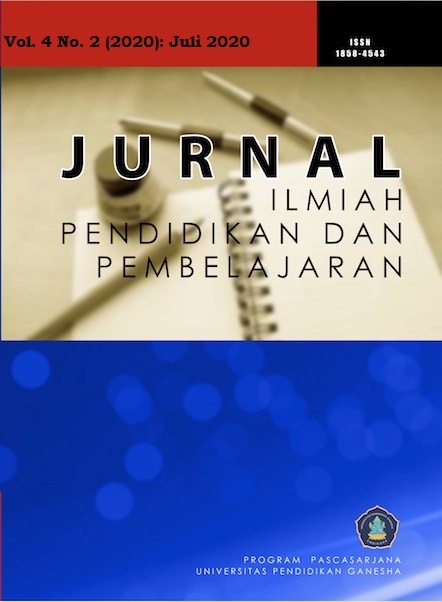Pengaruh Ragam Metode Pembelajaran terhadap Capaian Prestasi Belajar
DOI:
https://doi.org/10.23887/jipp.v4i2.24319Abstract
This research aims to analyze the effect of variety of study methods on study performance. Sample of this research was 56 students of finance diploma program got by purposive sampling method. Primary data was got by questionnaire. This research used research variable i.e. variety of study methods such as lecturing method, field trip method, STAD method and demonstration method as independent variables, and student’s study performance index as dependent variable. Using the multiple regression analysis, the research revealed that (i) lecturing method has significantly negative effect on student’s study performance index; (ii) field trip method has positive effect on student’s study performance index but has no significant; (iii) STAD method has positive effect on student’s study performance index but has no significant; (iv) demonstration method has positive effect on student’s study performance index but has no significant; and (v) all of study method simultaneous has no significant on student’s study performance index. In order to increase study performance, it is suggested to reduce the proportion of lecture method in the process of learning and increase the proportion of others study method such as field trip, STAD, and demonstration.
References
Arikunto, S. (2006). Prosedur Penelitian Suatu Pendekatan Praktik, Cet.XIII, Jakarta: PT Rineka Cipta
Darwyn, S. (2007). Perencanaan Sistem Pengajaran Pendidikan Agama Islam.Jakarta: PT. Gaung Persada Press.
Daryanto. (1999). Evaluasi Pendidikan, Cet. I, Jakarta: Rineka Cipta.Rineka Cipta.
Djamarah. (1997). Strategi Belajar Mengajar. Jakarta: PT. Rineka Cipta
Fathoni, R. I. (2011). Pengaruh Penerapan Metode Pembelajaran Student Teams Achievement Division (STAD) Terhadap HasilBelajar Siswa Kelas X SMK Perindustrian YogyakartaTahun Pelajaran 2010 / 2011. Skripsi Program Studi Pendidikan Teknik Otomotif, Fakultas TeknikUniversitas Negeri Yogyakarta
Mappa,S., Basleman, A. (1994). Teori Belajar Orang Dewasa. Proyek Pembinaan dan Peningkatan Mutu Tenaga Kependidikan.Ditjen Pendidikan Tinggi. Departemen Pendidikan dan Kebudayaan
Gujarati, D., Elmasari. (2010). Dasar-dasar Ekonometrika. Jakarta: Erlangga
Ghozali, I. (2006). Aplikasi Analisis Multivariat Dengan Program SPSS-Cetakan Keempat. Badan Penerbit Universitas Diponegoro Semarang
Mila, M. (2010). Implementasi Proses Pembelajaran Dalam rangka Penyiapan Sumber Daya Manusia di Lingkungan Kementerian Keuangan(Studi Kasus pada Crash Program Prodip I Keuangan Spesialisasi Kepabeanan dan Cukai di Balai Diklat Keuangan Yogyakarta). Prodising Seminar Nasional “Character Building for Educational Education”, Volume 5, Tahun 2010. Universitas Negeri Yogyakarta
Mila, M. (2011). Pengaruh Ragam Metode Pembelajaran Pada Materi Etika Profesi dan Pengembangan Pribadi Terhadap Output Pembelajaran. Kajian Akademis BPPK, 2011
Muchsin. (2013). Pengaruh Penggunaan Metode Karyawisata Terhadap Prestasi Belajar Kognitif Ips Kelas IV Sekolah Dasar. Jurnal Universitas Negeri Yogyakarta, Vol. II No. 9 Tahun 2013
Myristica, I.(2014). Pengaruh Metode Pembelajaran dan Kecerdasan Interpersonal Terhadap Hasil Belajar Sejarah Siswa SMA. Tesis Program Pascasarjana Universitas Negeri Jakarta
Nachrowi, D.N., Hardius, U. (2006). Pendekatan Populerdan Praktis Ekonometrika untukAnalisis Ekonomi dan Keuangan. Jakarta: Lembaga Penerbit Fakultas Ekonomi
Notoatmodjo, S. (2003). Pengembangan Sumber Daya Manusia. Jakarta: PT. Asdi Mahasatya
Rubiyo. (2011). Pengaruh Penggunaan Metode PembelajaranDemonstrasi Terhadap Minat Belajar Siswa Kelas XI Pada Sub Kompetensi Perbaikan/Servis Sistem Kopling di SMK Ma’arif 1 Nanggulan. Skripsi Program Studi Pendidikan Teknik Otomotif Fakultas TeknikUniversitas Negeri Yogyakarta
Sugiyono. (2009). Metode penelitian kuantitatif kualitatif dan R&D. Bandung:Alfabeta.
Sujarwo, D. (2012). Pengaruh Metode Pembelajaran dan Gaya Belajar Terhadap Hasil Belajar. Skripsi Fakultas Keguruan dan Ilmu Pendidikan Universitas Muslim Nusantara (UMN) Al-Washliyah.
Wanda, C. (2005). Upaya penerapan pendidikan karakter bagi mahasiswa (studi kasus di jurusan teknik industri UK Petra). Online at http://puslit.petra.ac.id/journals/industrial/
Downloads
Published
How to Cite
Issue
Section
License
Authors who publish with the Jurnal Ilmiah Pendidikan dan Pembelajaran (JIPP) agree to the following terms:
- Authors retain copyright and grant the journal the right of first publication with the work simultaneously licensed under a Creative Commons Attribution License (CC BY-SA 4.0) that allows others to share the work with an acknowledgment of the work's authorship and initial publication in this journal.
- Authors are able to enter into separate, additional contractual arrangements for the non-exclusive distribution of the journal's published version of the work (e.g., post it to an institutional repository or publish it in a book), with an acknowledgment of its initial publication in this journal.
- Authors are permitted and encouraged to post their work online (e.g., in institutional repositories or on their website) prior to and during the submission process, as it can lead to productive exchanges, as well as earlier and greater citation of published work. (See The Effect of Open Access)










